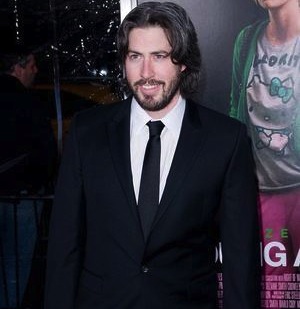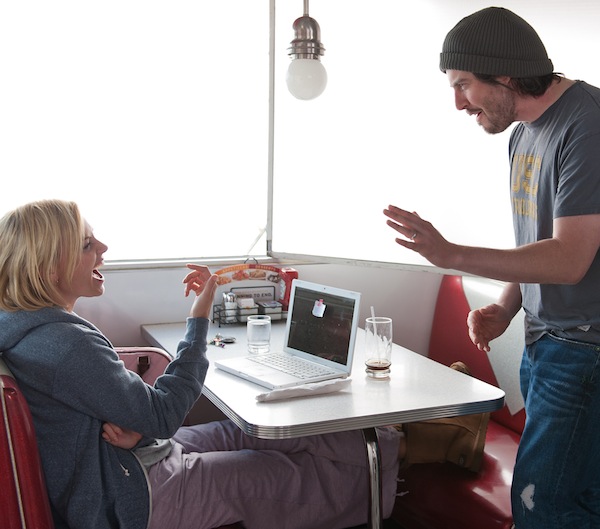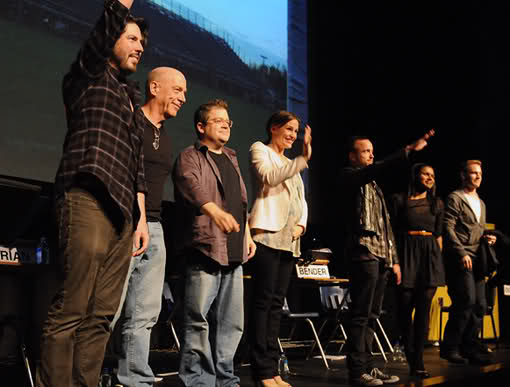 Director Jason Reitman is proving you don’t have to sell out to work in Hollywood. His films—Thank You For Smoking, Juno and Up in the Air—defy concrete definitions: balancing comedy and drama while utilizing indie style and raking in blockbuster dollars. His latest movie Young Adult continues the trend, taking the basics of a romantic comedy plot and twisting it with one of the least likable characters ever to appear on screen. But we love Charlize Theron’s Mavis—sympathetically at times, but equally magnetized by her inability to grasp reality. Not an easy task to pull off.
Director Jason Reitman is proving you don’t have to sell out to work in Hollywood. His films—Thank You For Smoking, Juno and Up in the Air—defy concrete definitions: balancing comedy and drama while utilizing indie style and raking in blockbuster dollars. His latest movie Young Adult continues the trend, taking the basics of a romantic comedy plot and twisting it with one of the least likable characters ever to appear on screen. But we love Charlize Theron’s Mavis—sympathetically at times, but equally magnetized by her inability to grasp reality. Not an easy task to pull off.
I sat down with Reitman to discuss what it takes to find the right balance for the amorphous genre of “dramedies,” bringing to life the grey-shaded Mavis and where his career could go next:
So I was just drinking a Diet Coke in the other room and it reminded me of the movie, the multiple scenes where the lead character Mavis chugs from a two-liter. And I was thinking, ‘Why is Diet Coke the saddest, most miserable drink?’
Jason Reitman: Diet Coke is not a sad drink. I think the idea of chugging a two liter bottle, first thing in the morning after a hangover…that’s a little sad. As an adult. I think if you’re nineteen years old, and you wake up in the frat house, and you drink some Coke, and eat some cold pizza—not so sad. You’re in your late thirties and you’re waking up alone? You drank enough to pass out? That’s a little bit sadder.
I love thinking through tangible representations of that sadness. I spoke to Diablo [Cody] before about those choices, figuring this script out, and she mentioned to me that she always comes to you with her scripts, regardless if you’re going to work on them or not. So, what was that kind of evolution of this story, and you deciding to tackle it?
JR: She had already written the script. She sent it to me. I thought the third act was fascinating and profoundly unique, and dark, and all of the things that I love. And we had a two-week process where she and I just worked on it together, because I just wanted to change a few things [to] see if I would direct it. And we got there, and I was like, ‘All right, let’s make this thing.’
What changed?
JR: I honestly can’t even…usually, little stuff.
But then, you want to tailor it for yourself. What kind of elements to you bring to the table?
JR: Yeah. I don’t even know how to explain it. It’s like…honestly, if I was just looking at your clothes, and was like, ‘Wouldn’t I stitch differently?’ It’s not like I’d change you from a shirt to a jacket. It’s like, ‘Oh, the button position should be a little higher. The pocket should be a little smaller.’
Gotcha. You’re injecting it with your own sensibilities, which may be invisible—
JR: Yeah…it’s not even injecting it with my own sensibility, it’s just…for me, the tonal line that I’d want to tell the story along, is here, and the story is here, and everyone once in a while, there’s just a few things that are outside of the tonal line.
The tone in this movie feels like a real balancing act, and I’m kind of curious how you made decisions about whether the film was becoming either too dark or too funny. Was that a challenge for you to figure out how every scene should play
JR: It’s not something I think about. There are certain things that some directors are good at, and there are certain things that others are. I think I have a fairly good sense of pitch…sorry to reuse a metaphor, but it explains it well. I read a script, and I go, ‘This is in the key of C.’ I just instinctually think, ‘This is the key of C.’ And then after that, I listen to a piece of dialogue, I see a piece of wardrobe, I watch a performance—whatever it is. I look at it, and I go, “That’s in the key of C.’ Or, ‘No, that’s like a C-sharp.’ ‘That’s F! All right, we’ve got to really clean that up!’ It’s just watching and listening…
Gut feelings.
JR: Well, that’s all directing is. Responding to various types of material, and how they strike you. It’s not that it’s not creative, because there is a lot of creation that goes on, but a lot of it is feeling it, and just knowing whether it’s in pitch or not.
 Was it important to make Mavis sympathetic to the audience at any point?
Was it important to make Mavis sympathetic to the audience at any point?
JR: Yeah, I think she’s sympathetic throughout. Maybe that’s just me. I thought, on the page, Diablo had written a character that was a full human being. Someone who wanted to be loved. Someone who was trying to find her purpose desperately. And in doing so, she was acting out. In doing so, she was misbehaving, big time. But Charlize picked up on that. She didn’t just portray some thin character portrait of a mean girl. She created a woman who was broken, and vulnerable.
How did you land on Charlize? Did she audition for the movie?
JR: [Laughs] NO!
I don’t know! You never know!
JR: She doesn’t audition for anybody. She doesn’t need to.
Well, what did you find in her? Or, why did you gravitate toward her for this part?
JR: I thought her nature was right. I thought her sense of humor was right. She never judges her characters, which is something I love in a performer. She had the confidence to do this. I knew she wouldn’t pull back in the third act. And I know there’s an instinct, when you think you’re flying the plane into the ground, to just pull up. She doesn’t pull up.
And what does she bring to the table compared to some of the other actors that you’ve worked with? How was your relationship on set? Was she inspiring you in different ways?
JR: She’s just lovely on set. What’s great about her on set is that she’s incredibly gifted, incredibly skillful and incredibly hardworking. But she doesn’t do that kind of “actory bullshit” of making more out of her job than it is. She does her job, like everyone else on set. She does it brilliantly. And then she’s a normal person. And funny, and dark and cool to be around. And that’s great. Because everyone on set is doing their job. And that’s not to say that I’m insensitive to an actor who has to do a tricky scene, who needs some time and space. Of course. But, she didn’t live in her wardrobe. She wasn’t in character all the time. She wasn’t doing anything like that. She just knows how to do her job, and that’s pretty great.
I’ve seen your films, and you definitely have a stylistic edge in the way that you present them Do you feel like Young Adult was a departure from some of the choices you’ve made in the past?
JR: This film was cleaner. I’m really proud of that. It was really important that the world feel real, that it not feel like a caricature within a heightened environment. So, I felt that it was my job to make the world as real as possible so that her character felt as real as possible. And to stay out of the way of the great writing and great acting that was happening.
Where did you shoot the film?
JR: Upstate New York.
And why was that a perfect fit? I feel like the environment is really important to her story—this small-town vibe.
JR: New York gave us an opportunity to make this film with a tax credit and a local crew base, and a whole bunch of things. That made it possible. We shot a week in Minneapolis, which was a lot of fun. And then we came out here and shot the rest of it. The truth is, America has been so homogenized that you can shoot an urban sprawl anywhere. The majority of this film I could have shot in so many places in the U.S., because so many places have started to look identical.
Kind of terrifying.
JR: It is what it is.
Young Adult stands out as the type of film you don’t often seen coming out of the movie studios. Did you find it difficult getting the film made?
JR: We were really lucky. I think the combination of Diablo, Charlize and I…and the price, because it was only twelve million dollars. We found a way. And Paramount was extraordinarily supportive.
Have you ever had that struggle in your career?
JR: No. I’ve always made my movies cheap enough, and I’ve always had great actors who stood by me. And that combination has made it possible.
Is the “one for them, one for me” a relationship you see growing in Hollywood? Is that the way the world works?
JR: The nice thing has been, so far, one for us. I make them. I’m responsible about the cost of the film. And my films have been fortunate enough to make money. If all my movies started losing money it’d be a very different landscape for me to try and get these things done. But, the first one made some money, and the last two made a lot of money. And we’ll see what this one does.
That’s a good thing to have on your resume.
JR: Hopefully this one will make some money.
I get the sense that you’re a movie buff. Were there films that you went back to, films you enjoy, that you used to hone the vibe of Young Adult?
JR: Uh…I guess, sensibility-wise, there’s a Swedish film called Together. It’s a brilliant film that’s got a really good vibe to it. And I loved how the Mike Mills film, Beginners, was shot. I showed that to my DPS, [and said], ‘I really like how this was shot.’
What inspires you about filmmaking?
JR: Oh, there’s a film called Cold Weather that we watched, too. An indie from this last year that I really liked.
 As you evolve in your career, what continues to challenge you and keep you interested in filmmaking as a storytelling medium? What’s always new about it?
As you evolve in your career, what continues to challenge you and keep you interested in filmmaking as a storytelling medium? What’s always new about it?
JR: Well, I’m always trying to explore emotional stuff that’s new. On the first film, I just wanted to make people laugh. On the second film, I was trying to make them feel romantic. By the third one, I was trying to make them feel lonely. On this one, I’m trying to make them feel uncomfortable. The manipulation changes. The goal changes. And I grow up more with each. I become a more mature adult with each film. That changes what I’m trying to say.
As you continue down this road, is film the only thing that you want to be making? Would you ever branch out to other forms of storytelling?
JR: Ceramics? I’ve been doing these LACMA live readings [a series of staged screenplay readings performed by famous actors]…
Yeah! They sound amazing.
JR: Oh my God. They’re phenomenal.
What energizes you about taking those classic scripts on and bringing new people in to the fold?
JR: You know, I did a table read in one of my movies, and I thought, ‘Why don’t we do this all the time?’ And it hit me that plays have revivals. You can see different plays, different characters…a movie has one version and one version alone. And I thought, ‘Wouldn’t it be great to hear other actors deliver this dialogue, and just to hear how different it [might] be from another great actor?’ And when Elvis Mitchell took over the program at LACMA, I realized, ‘Here’s this great opportunity where we can do something for the city of Los Angeles, raise money for LACMA, give actors the opportunity to do dialogue they’ve never done before, and give an audience a truly once-in-a-lifetime experience. And selfishly, I get to go to these screenplays that I love again. The Breakfast Club was outstanding, The Apartment was just…
Sounds amazing.
JR: You know what was interesting with The Apartment is…with The Breakfast Club, everyone in the theater had seen the movie twenty times. For The Apartment, a lot of people in the theater had never seen the movie, and that was their first experience with the film…which carried an unusual amount of responsibility. So, the next one we’re doing is Princess Bride. I presume that one will be a little bit more like—
Who is involved in that one?
JR: What actors?
Yeah.
JR: It’s all secret.
Oh!
JR: I only announce, usually, in the days leading up. Keep a few for surprise at the theater. But it brings me so much joy I cannot even explain.
=”font-style:>



